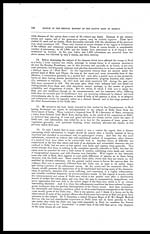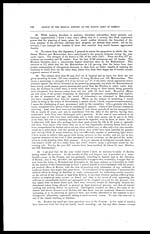Medicine - Institutions > Army health reports and medical documents > Sketch of the medical history of the native army of Bombay > Sketch of the medical history of the native army of Bombay, for the year 1872
(194) Page 185
Download files
Individual page:
Thumbnail gallery: Grid view | List view

185
SIND DISTRICT OF THE ARMY.
17. Assuming that the complaint as witnessed in Sind is, at least in its fully developed
stage, sufficiently alike in its chief feature to the Delhi sore which, according to Lord Mark
Kerr's experience, is alleviated so signally by the proximity of trees and grass, it will be expe-
dient now to consider how far in like manner the presence of trees, vegetation, and cultivation
of the soil, generally, have influenced the prevalence and practicableness of the Sind sore.
18. I entirely concur in the general principle enunciated, that to bring extensive tracts
of barren and waste land under judicious irrigation and cultivation in connection with a good
water-supply, careful and thorough drainage, and other well-ordered sanitary arrangements,
would do much towards the removal of epidemic diseases generally; would also greatly miti-
gate the severity of epidemics, and by improving the general health of the inhabitants, would
place them in a more favourable position to resist malarious poisoning and other debilitating
influences, which, under existing circumstances, are too frequently met with, and which render
the people susceptible to ailments of otherwise trifling import; and I have no doubt, if the
above measures were scientifically and thoroughly adopted, Sind sore would be greatly
alleviated, and in time might even disappear. But I cannot endorse the opinion that the par-
tial and desultory planting of trees, with even all the provisos I have mentioned, and which, in
most cases, would be impracticable, would exercise any appreciable influence in lessening
the frequency or alleviating the condition of these sores; and, moreover, I believe that unless all
the sanitary conditions I have noticed be carefully carried out in their entirety, the presence of
trees, particularly in large numbers in a country like Sind, is attended with results rather the
reverse of those mentioned by Lord Mark Kerr. In making this statement it must be borne
in mind that Sind, unlike other tropical countries, is without a regular annual rainfall. Rain
certainly is met with, but it is uncertain, partial, and generally scanty, and can never be de-
pended upon as a means of irrigation. But Sind, like Egypt, has another and very abundant
source from which it derives its chief water-supply. I mean the river Indus; and the country
being for the most part perfectly flat—indeed many portions are considerably below its level—
there is every facility afforded for conducting its waters by means of countless canals and water
courses over large tracts of the country bordering its banks. In the month of April the river
begins to rise, the canals commence to flow and remain full until September or October, when
by the partial reflux to the river, aided by evaporation and absorption, the water gradually
disappears. The soil from its nature and position admits of no drainage, and the result is an
enormous amount of sub-surface water readily reached at from 15 to 18 feet. Here, at the
outset, is presented a fatal objection to one of the conditions included in Lord Mark Kerr's
suggestion, viz., "judicious draining." With regard to trees and vegetation there is of
course no difficulty. A light alluvial soil, with an unlimited supply of fresh water, insures
against failure in this respect. But this begets another difficulty and a serious one, the keep-
ing within due limits the exuberant growth of the trees and vegetation which this state of
things calls into existence; and when to this is added the subsequent drying up of the nume-
rous water-courses, laden as they are with low forms of animal and vegetable life, malaria is
not only developed in large quantities, but, owing to the breeze being obstructed by the trees,
it clings to the luxuriant vegetation abounding on every side, and renders these refreshing and
pleasant-looking retreats far more unhealthy than the dry and dusty plains. Besides the sta-
tion of Jacobabad, which I have especially in view while making these remarks, there are
several other towns in Upper Sind where trees and vegetation abound, and it so happens that it
is notably from these places and the neighbouring districts that the Sind sore has become
so well known. All these districts are notorious for malaria, and although some authorities
are indisposed to trace any connection between it and the Sind sore, I have strong opinions
on the subject, and believe the one to have a direct bearing on the other. Malaria seems to
play an important part in predisposing the system of certain persons to take on an imperfect
suppurative or ulcerative action on very slight provocation. In these persons a simple boil or an
accidental abrasion frequently becomes a Sind sore in a short time. And not only so, but
obstinately refusing to heal until the advent of the cold weather, or the patient is removed
altogether from the malarious locality, when rapid healing occurs spontaneously.
19. I had hoped that some data might be found in the records of military and civil
hospitals, which I might have quoted in support of the opinion I have advanced against the
one held by Lord Mark Kerr, but I can trace neither statistics nor writen opinions amongst the
various records devoted to this view of the subject. However, during my late tour of inspec-
tion, I was able personally to interchange opinions with several of the medical officers, especially
with those stationed at Jacobabad, where trees and vegetation exist to a greater extent than is
to be found in any other part of Sind; and where also boils and ulcers are among the recog-
nized diseases of the station, affording these officers abundant opportunities of annually
extending their acquintance with the peculiarities of this disease during its entire course.
And their experience of these boils or sores, which, as a rule, are coincident with the excessive
heat and moisture prevailing during the height of the periodical overflow of the canals and
water-courses in their densely wooded station, is that they are in some manner connected with
the numerous trees, the humid warm atmosphere, and the complete absence of drainage; all of
which are to be met with in their greatest extremes at Jacobabad.
47 S
Set display mode to: Large image | Zoom image | Transcription
Images and transcriptions on this page, including medium image downloads, may be used under the Creative Commons Attribution 4.0 International Licence unless otherwise stated. ![]()
| Permanent URL | https://digital.nls.uk/75013220 |
|---|




